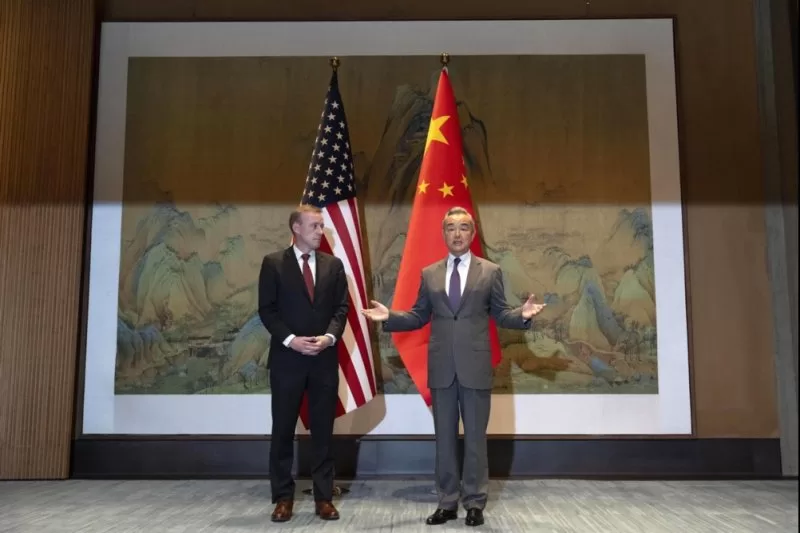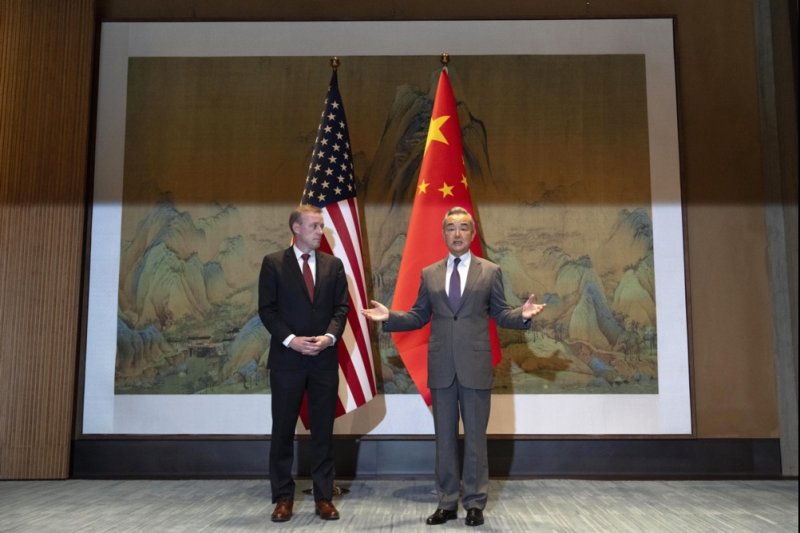1 of 2 | Chinese Foreign Minister Wang Yi (R) speaks Tuesday before talks with White House national security adviser Jake Sullivan at Yanqi lake in Beijing, China. The two went over a wide-range of topics during their two day set of bilateral meetings. Photo Provided by Ng Han Guan/EPA-EFE
Aug. 28 (UPI) — After a visit this week by National Security Adviser Jake Sullivan, the United States and China agreed, among other things, for President Joe Biden and Chinese leader Xi Jinping to speak by phone.
The White House on Wednesday described Sullivan’s two-day talks from Tuesday to the following day with China’s foreign minister Wang Yi as “candid, substantive and constructive,” according to a readout of his meeting with Chinese officials.
On Wednesday, the administration stated both China and the U.S. “welcomed” renewed efforts to maintain an open line and clear channel of communication, which now include plans for a “leader-level” call in “coming weeks” between Xi and Biden, who is now set to exit the president in January after his four-year term ends.
They also reaffirmed the importance of “regular, ongoing military-to-military communication” with similar plans to have a “theater commander” call in “the near future.”
Their talks this week were centered on the implementation of plans and renewed commitments to take the lead on other global matters touching a variety of bilateral, regional and global issues, such as ending the flow of illicit narcotics from China to U.S. markets, “military-to-military communications” and AI safety and risk.
Sullivan’s two-day trip to Asia to meet with Wang, the director of China’s Foreign Affairs Commission and part of the Communist Party’s top brass in its now 20th sitting politburo, covered a wide range of important topics between the two nations.
The administration said it was part of the ongoing diplomatic efforts to keep open the two-way line of communications between the United States and China after a rocky several months, and as next steps to “responsibly manage the relationship” between the two nations by outlining the progress and next steps to crucial plans as they were outlined by Xi and Biden at their November 2023 Woodside Summit in California.
Biden and Xi last met in person during November’s visit, after which China pledged to crack down on the flow of fentanyl into the United Statues as use of the powerful opiate has soared in recent years.
An unnamed senior Biden administration official told POLITICO prior to Sullivan’s visit the purpose of their “strategic level of communication” was so to allow the two global economic and military powers “really to get into details” on topics the White House was looking at as “intensive policy” and “how we see different situations.”
Sullivan had previously met with Wang prior to the Biden-Xi summit and the two world leaders are expected to attend the 2024 G20 summit in Rio de Janeiro after the U.S. presidential election.
“It really is about clearing up misperceptions and avoiding this competition from gearing into conflict, more than anything else,” a senior unnamed White House official told Politico in an interview,” the unnamed official was quoted as saying.
In April, the two leaders discussed AI, counternarcotics as well as Russian access to Chinese technology.
On Wednesday, in addition to high-level talks on next steps to reduce the global flow of illicit synthetic drugs, the two diplomats touched on the the cooperation of law enforcement on the continued repatriation of undocumented migrants.
Sullivan underscored with Wang at their visit “the importance of concrete steps” to tackle the world climate crisis, with China likewise “welcoming further discussions” to take place during a later visit by John Podesta, Biden’s senior adviser for international climate policy.
It remains one of America’s top priorities, according to the White House, to resolve the cases of wrongfully detained American citizens who had been subjected to Chinese exit bans, Sullivan expressed to Wang. The administration said Sullivan also reinforced the “U.S. commitment to universal human rights and fundamental freedoms.”
International stability and peace, specifically in the Taiwan Strait region, was also a vital topic of discussion between Wang and Sullivan as a spike in diplomatic tensions over recent months and years has been apparent.
Wang warned the U.S. on Wednesday that Taiwan’s independence poses the greatest threat to regional stability and would launch a war if Taiwan were ever to officially declare independence.
The United States has expressed concern over China’s ongoing financial support for the base of Russia’s defense industry as a beneficiary to the Russian war in Ukraine and “its impact on European and transatlantic security.”
Noting the importance of ongoing efforts at “strategic channel of communication” over the last bumpy year of icy diplomatic relations, Sullivan told Wang the United States remains committed to “maintaining high-level diplomacy and working level consultations on an ongoing basis.”
Addressing the Indo-Pacific, Sullivan also reaffirmed the U.S. position on its allied military commitments to other nations in the region, expressing concern about the Chinese government’s “destabilizing actions against lawful Philippine maritime operations in the South China Sea.”
But the two have shared concerns over matters relating to Burma, the neighboring Asian nation to China’s south formally known as Myanmar, ongoing issues in the Middle East and the Korean peninsula, which comprises the communist-aligned North Korea pitted against the U.S.-aligned South Korea.

